


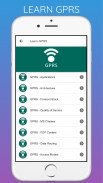


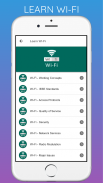

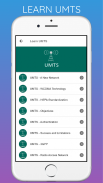
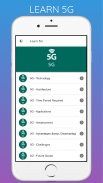
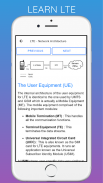
Learn All Telecom Technology Tutorials Offline ⭐️

Опис програми Learn All Telecom Technology Tutorials Offline ⭐️
Learn 5G
5G is the Fifth Generation technology. It has many advanced features potential enough to solve many of the problems of our mundane life.
Learn CDMA
Code Division Multiple Access (CDMA) is a channel access method normally used by 3G radio communication technology as well as in some other technologies.
Learn FTTH
More commonly known as “Future Proof”, Fiber to the home (FTTH) is a new technology to deliver a communication signal over optical fiber. It is an efficient and economic substitute of existing copper infrastructure including telephone and coaxial cable.
Learn GPRS
General Packet Radio Service (GPRS) is a Mobile Data Service accessible to GSM and IS-136 mobile phones users. This service is packet-switched and several number of users can divide the same transmission channel for transmitting the data.
Learn GSM
This tutorial has been designed for readers who want to understand the basics of GSM in very simple terms. This tutorial provides just about enough material to have a solid foundation on GSM from where you can move on to higher levels of expertise.
Learn i-mode
NTT DoCoMo's i-mode is a mobile internet service popular in Japan. i-Mode was invented by a team led by Mari Matsunaga in February 1999 at NTT DoCoMo. This tutorial explains the basic concepts and applications of i-Mode.
Learn LTE
This tutorial has been designed for audiences with a need to understand the LTE technology basics in very simple terms. This tutorial will give you enough understanding on LTE technology from where you can take yourself at higher level of expertise.
Learn NGN
Next Generation Networks (NGN) is a part of present-day telecommunication system, which is equipped with capabilities to transport all sorts of media, such as voice, video, streaming audio/video, text, etc. NGN is developed around the concept of packet switching as in Internet Protocol architecture.
Learn Session Initiation Protocol
SIP is a signalling protocol designed to create, modify, and terminate a multimedia session over the Internet Protocol. It is an application layer protocol that incorporates many elements of the Hypertext Transfer Protocol (HTTP) and the Simple Mail Transfer Protocol (SMTP).
Learn Telecom Billing
Telecom Billing is a process of collecting usage, aggregating it, applying required charges and finally generating invoices for the customers. Telecom Billing process also includes receiving and recording payments from the customers. This tutorial gives you a complete understanding on Telecom Billing.
Telecommunication Switching Systems and Networks (TSSN)
This tutorial will help you understand the different aspects of telecommunication switching systems. It is designed to deliver knowledge about the basic concepts of telephony.
Learn UMTS
The Universal Mobile Telecommunications System (UMTS), based on the GSM standards, is a mobile cellular system of third generation that is maintained by 3GPP (3rd Generation Partnership Project).
Learn WAP
WAP is an international standard establishing how mobile devices can access information on the Internet. It is a widely used set of protocols used on wireless devices such as mobile phones and PDAs. This tutorial helps you in understanding WAP technology starting from its basics.
Learn Wi-Fi
WiFi is primarily a local area networking (LAN) technology designed to provide in-building broadband coverage. It is based on IEEE 802.11 specification. This tutorial gives you a basic understanding on WiFi.
Learn WiMAX
WiMAX is one of the hottest broadband wireless technologies around today.It is based on IEEE 802.16 specification and it is expected to deliver high quality broadband services. This is a brief tutorial that covers the fundamentals of WiMAX.
Learn WML
WML is an XML language used to specify content and user interface for WAP devices like PDA and Mobile Phones. The WAP forum provides a DTD for WML.


























